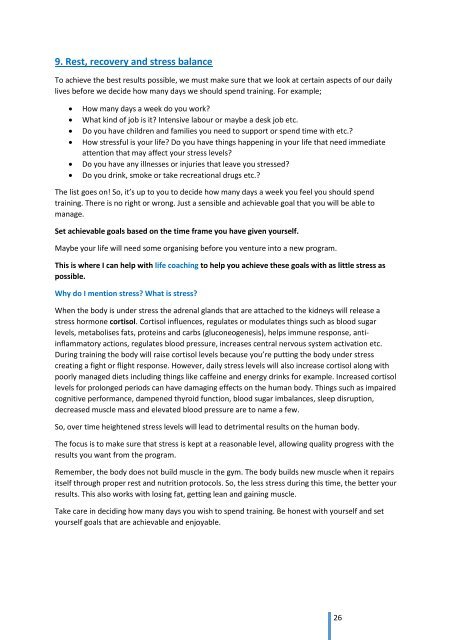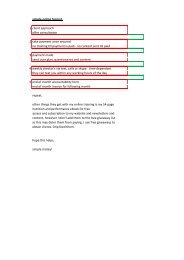You also want an ePaper? Increase the reach of your titles
YUMPU automatically turns print PDFs into web optimized ePapers that Google loves.
9. Rest, recovery <strong>and</strong> stress balance<br />
To achieve the best results possible, we must make sure that we look at certain aspects of our daily<br />
lives before we decide how many days we should spend training. For example;<br />
<br />
<br />
<br />
<br />
<br />
<br />
How many days a week do you work?<br />
What kind of job is it? Intensive labour or maybe a desk job etc.<br />
Do you have children <strong>and</strong> families you need to support or spend time with etc.?<br />
How stressful is your life? Do you have things happening in your life that need immediate<br />
attention that may affect your stress levels?<br />
Do you have any illnesses or injuries that leave you stressed?<br />
Do you drink, smoke or take recreational drugs etc.?<br />
The list goes on! So, it’s up to you to decide how many days a week you feel you should spend<br />
training. There is no right or wrong. Just a sensible <strong>and</strong> achievable goal that you will be able to<br />
manage.<br />
Set achievable goals based on the time frame you have given yourself.<br />
Maybe your life will need some organising before you venture into a new program.<br />
This is where I can help with life coaching to help you achieve these goals with as little stress as<br />
possible.<br />
Why do I mention stress? What is stress?<br />
When the body is under stress the adrenal gl<strong>and</strong>s that are attached to the kidneys will release a<br />
stress hormone cortisol. Cortisol influences, regulates or modulates things such as blood sugar<br />
levels, metabolises fats, proteins <strong>and</strong> carbs (gluconeogenesis), helps immune response, antiinflammatory<br />
actions, regulates blood pressure, increases central nervous system activation etc.<br />
During training the body will raise cortisol levels because you’re putting the body under stress<br />
creating a fight or flight response. However, daily stress levels will also increase cortisol along with<br />
poorly managed diets including things like caffeine <strong>and</strong> energy drinks for example. Increased cortisol<br />
levels for prolonged periods can have damaging effects on the human body. Things such as impaired<br />
cognitive <strong>performance</strong>, dampened thyroid function, blood sugar imbalances, sleep disruption,<br />
decreased muscle mass <strong>and</strong> elevated blood pressure are to name a few.<br />
So, over time heightened stress levels will lead to detrimental results on the human body.<br />
The focus is to make sure that stress is kept at a reasonable level, allowing quality progress with the<br />
results you want from the program.<br />
Remember, the body does not build muscle in the gym. The body builds new muscle when it repairs<br />
itself through proper rest <strong>and</strong> <strong>nutrition</strong> protocols. So, the less stress during this time, the better your<br />
results. This also works with losing fat, getting lean <strong>and</strong> gaining muscle.<br />
Take care in deciding how many days you wish to spend training. Be honest with yourself <strong>and</strong> set<br />
yourself goals that are achievable <strong>and</strong> enjoyable.<br />
26




